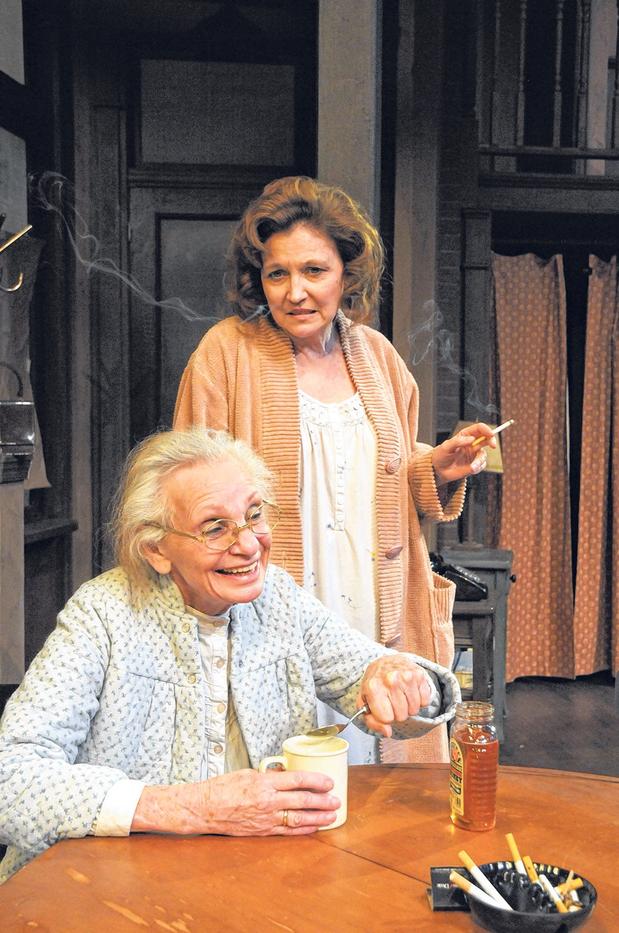In today’s Wall Street Journal I report on a rare and important revival of The Effects of Gamma Rays on Man-in-the-Moon Marigolds at Palm Beach Dramaworks. Here’s an excerpt.
* * *
It’s puzzling to watch a good play fall out of fashion. Paul Zindel’s “The Effects of Gamma Rays on Man-in-the-Moon Marigolds” was written in 1964, opened Off Broadway in 1970, wowed the New York critics, won a Pulitzer Prize, was turned into a movie by Paul Newman and Joanne Woodward in 1972 and looked like a deservedly sure thing in the posterity sweepstakes for many years thereafter. But while it continues to be performed by students and amateurs to this day, I’m not aware of any major professional staging that’s taken place in recent years.
 Palm Beach Dramaworks’ new production of “The Effects of Gamma Rays on Man-in-the-Moon Marigolds” would be worthy of note for that reason alone. Fortunately, there’s a better reason to see it: William Hayes, the company’s artistic director, has given Mr. Zindel’s play the kind of revival of which every frustrated playwright dreams, one so profoundly comprehending and persuasively acted that you’ll leave the theater wondering how “Gamma Rays” could ever have been forgotten, however briefly. Enhancing the immediacy of the staging is the troupe’s unusually shallow 218-seat theater, whose last row of seats is only 34 feet from the stage. The handsome new venue, which opened in November, manages to preserve the striking intimacy of the fast-growing company’s old 84-seat performing space.
Palm Beach Dramaworks’ new production of “The Effects of Gamma Rays on Man-in-the-Moon Marigolds” would be worthy of note for that reason alone. Fortunately, there’s a better reason to see it: William Hayes, the company’s artistic director, has given Mr. Zindel’s play the kind of revival of which every frustrated playwright dreams, one so profoundly comprehending and persuasively acted that you’ll leave the theater wondering how “Gamma Rays” could ever have been forgotten, however briefly. Enhancing the immediacy of the staging is the troupe’s unusually shallow 218-seat theater, whose last row of seats is only 34 feet from the stage. The handsome new venue, which opened in November, manages to preserve the striking intimacy of the fast-growing company’s old 84-seat performing space.
At first glance there doesn’t seem to be much to “Gamma Rays.” It’s a one-set drama about the plight of a fatherless family teetering on the edge of abject poverty, a subject that has been done to death ever since “The Glass Menagerie” opened on Broadway in 1945. It has five characters, all of them women, one of whom has a bit part and one of whom never speaks, and it is dominated, as is customarily the case with such plays, by the unhappy mother, whose soul has been crushed by the struggle for survival. It is (mostly) told from the point of view of one of her children, a sensitive young girl who is clearly the author’s alter ego, and its tone alternates between delicate poetry and harsh realism.
You’ve heard it all before? Maybe–but not like this.
To be sure, Mr. Zindel’s plot is as simple as his premise. Tillie Hunsdorfer (Arielle Hoffman), the sensitive child, has been encouraged by one of her teachers to compete in a science fair, and she and Ruth (Skye Coyne), her older, epileptic sister, long desperately for Beatrice (Laura Turnbull), their mother, to come to the awards ceremony. But Beatrice, incapacitated by self-pity and drink, is no longer capable of summoning up any love for her children, and when they lose patience with her at last, she lashes out in a way that is shocking enough to make the audience gasp with horror.
Stock stuff, in other words, but Mr. Zindel has charged it with the kind of passionate feeling that can ennoble the least orginal of scripts, and no sooner does “Gamma Rays” get under way than you are drawn irresistibly into the Hunsdorfers’ unhappy lives. He also takes care to provide just enough hope to make the play bearable, though never so much as to undercut its hard-earned anguish….
* * *
Read the whole thing here.
Terry Teachout on the arts in New York City
